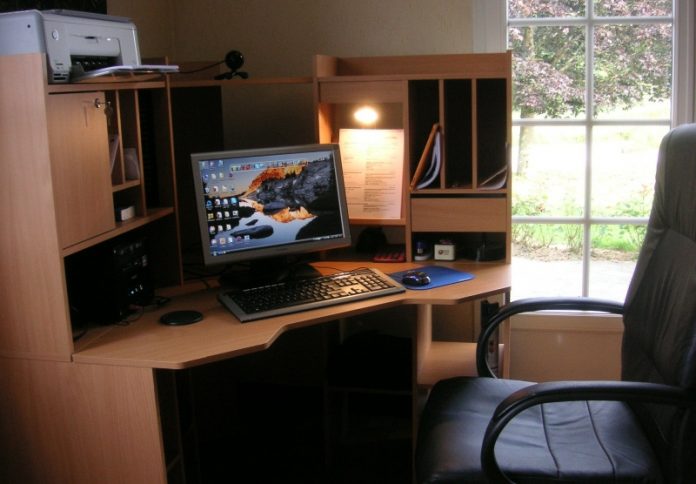The worldwide Coronavirus (COVID-19) pandemic changed the way we work. A lot of businesses still haven’t got all their staff back in and they are working from home or on hybrid working pattern between the office and home.
Sounds great being able to work from home and the comfort of your own surroundings doesn’t it. But working from home isn’t as easy as it sounds, you need a lot of discipline. You will no longer be surrounded by colleagues, there will be no one to have a chat with and you can get easily distracted by social media, television or chores around the house.
Working from home can be very rewarding and less stressful but only if you are structured, disciplined and keep up your productivity. It can also be a very lonely and solitary experience (especially during lockdown and self-isolation as you cannot just get up and go out).
To successfully work from home, I have some tips that you can follow:
Dedicated Workspace
Create some dedicated workspace in your home. If you are lucky enough to have a spare room or study, turn this into your office. Having a place to “go to” for work puts you in a much better state of mind than trying to work from your living room, sitting on a comfy sofa with the television on.
Make It Look More Like An Office
Wherever you decide is your dedicated workspace, make it look like a workspace or office. Having it looking like a spare room or even your living room will be too distracting and less productive. You might have issues with not being able to find what you need, take more breaks than necessary and end up doing nothing.
Make sure you have a desk, comfortable chair, laptop, secure and stable internet connection, good lighting and any other paraphernalia that you might need to assist you in your work.
If you prefer to stand whilst working, I can highly recommend the Deskmate Minimate – Laptop Standing Desk to turn your desktop into a standing desk, or if you prefer a more hi-tech version, I love the FlexiSpot E5 Electric Standing Desk. Sitting down all day is bad for our health and this easy to use, foldable desk convertor allows you to switch between sitting and standing with ease.
If you are using your mobile phone to take calls all day, make sure you can keep it charged. A wireless charger is an excellent way to do this as no cables will be getting in the way. If you do have to leave the office, a portable charger/powerbank is a good idea.
And if you are always misplacing items, why not think about investing in a Bluetooth tracker like the Tile Sticker to easily find them using your phone (or even one that helps locate your phone).
Set Regular Working Hours
It is very easy to get into the mindset that because you are working from home you can start and finish whenever you want. This doesn’t work, you really do need to set start and end times for your day – and stick to them! By doing jobs as and when you feel like it can see you working later into the night and your work then starts to creep into your personal life. If you are used to working 9 to 5, then stick to this. Routine is a good habit to have. If you are working for someone else rather than yourself, you may be required to work between certain hours anyway and your employer would not be very happy if you chose to work around their set times.
Set Boundaries
Once you have got your workspace established and your working hours organised, set boundaries for working and stick to them. Make sure that colleagues know these hours and don’t answer emails or calls outside these hours. Don’t be overly available, allowing people to contact you at anytime of the day.
Get Dressed
Start the working day properly dressed. Don’t start work in your pyjamas. It can make you feel more at ease by wearing what you would normally wear going out to work and put you in a work frame of mind rather than a “pyjama day” mindset. After all, taking a video call from your boss or a client whilst in your pjs doesn’t look very professional.
Use a Planner
Plan your day(s) and week(s) using a planner. A desk planner is good, but I prefer a bigger wall planner as it is much easier to see those important tasks.
Make To-do Lists
Start each day by making a list of tasks that you need to do each day. Be realistic, adding too much that you know you won’t have time to complete will see you loading too much stress on to your day and reducing productivity and increasing the potential for errors.
Take Regular Breaks
Make sure that you take regular breaks; that includes coffee breaks, lunch breaks and a break from the screen to reduce eye strain (you can always make calls or file paperwork on screen break times).
Make Sure Any Company Data Is Secure
Data is very valuable and must be protected. Use a secure VPN or remote access connection to access work networks (if your employer allows this). Make sure your router is secure: change default passwords, you can even add a secure router to your home network.
If you are using your own laptop, create space on the hard drive where you can add an encrypted secure folder to store files. You could even go as far as creating a separate user account purely for work, keeping your work and personal accounts separate. And why not consider a hardware security key like a YubiKey to authenticate logins to your accounts.
Backup and secure any data. Make sure this is daily backup up to a password protected USB drive, secure cloud service, or transferred to the company’s servers at the end of every working day. If using USB drives or external hard drives for backups, make sure that at the end of the day they are locked away (ideally away from the computer), preferably in a safe.
Keep In Touch With Colleagues
Don’t cut yourself off from your work colleagues. Keep in touch with a phone or video call, rather than email, regularly. This not only decreases the feeling of isolation, but helps you share ideas and keep everyone updated on what is happening in the workplace whilst keeps up morale (and is also good for mental health being able to speak to others).
Home working doesn’t have to mean out of sight, out of mind!
So if you are working from home, stay productive, stick to routine and try to find a good work/home life balance. Hopefully these tips with help you work from home a bit better.

















